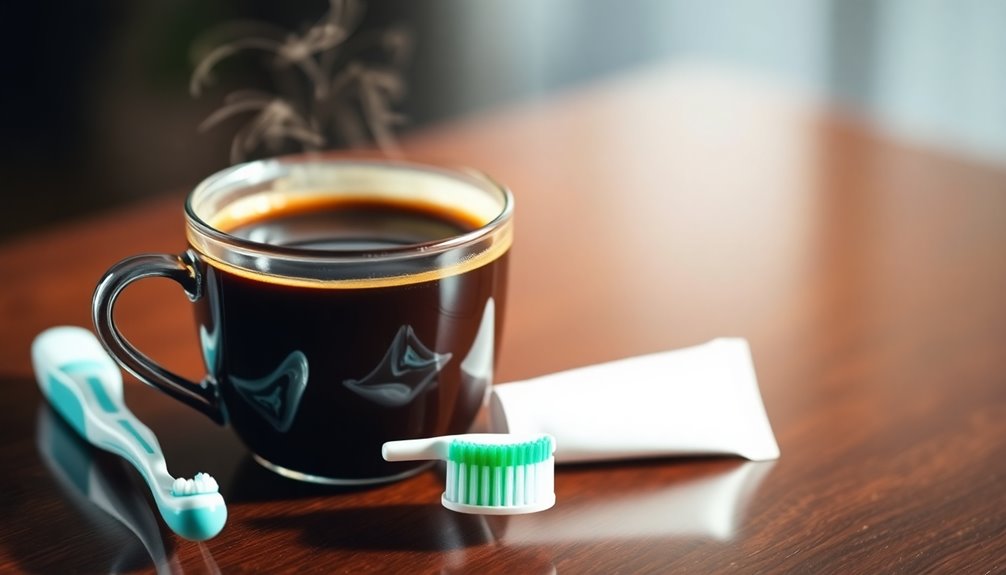If you're a coffee lover, you've likely noticed its impact on your teeth. Coffee contains compounds that can stain enamel and its acidity might lead to erosion over time, making your teeth more sensitive and prone to cavities. To counteract these effects, rinse your mouth with water after coffee, and wait at least 30 minutes before brushing your teeth. Staying hydrated is key, as coffee can dry out your mouth, increasing the risk of decay. By following a few easy strategies, you can enjoy your coffee while protecting your smile—discover additional tips that can enhance your oral health!
Key Takeaways
- Coffee can stain teeth due to chromogens and tannins; rinsing with water after consumption can help reduce staining effects.
- The acidic nature of coffee can erode enamel; waiting 30 minutes before brushing allows enamel to reharden.
- Increased coffee consumption may lead to tooth sensitivity; maintaining good oral hygiene can alleviate discomfort from erosion.
- Caffeine's diuretic effect causes dry mouth, increasing cavity risk; staying hydrated with water is essential for oral health.
- Using fluoride toothpaste and scheduling regular dental check-ups can strengthen enamel and detect potential oral health issues early.
Staining Effects of Coffee
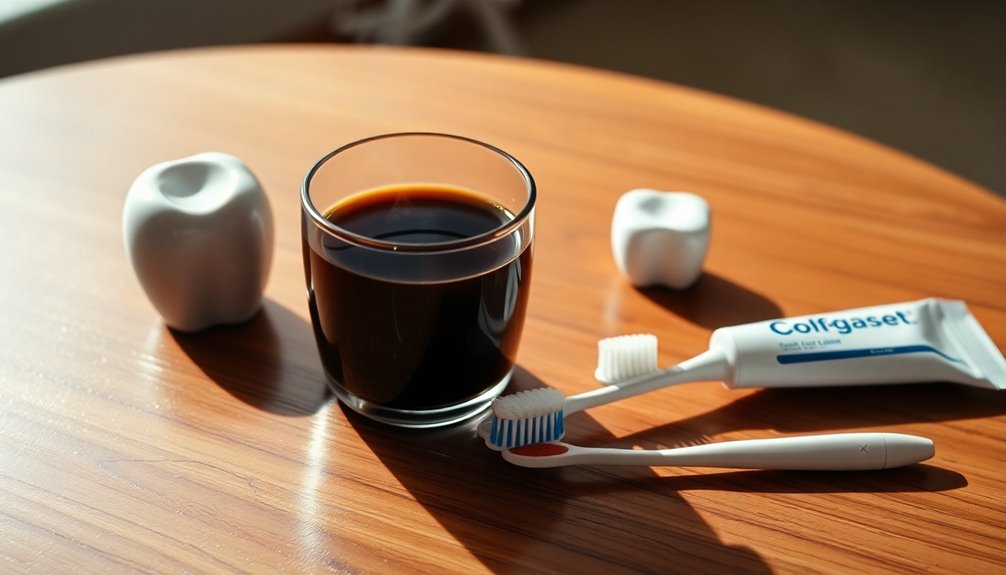
Coffee lovers, beware! Those delicious sips of coffee might be doing more harm than you think.
Coffee contains chromogens and tannins that can lead to coffee stains, binding to your tooth enamel and causing yellow or brown discoloration over time. The severity of these staining effects depends on how strong and frequent your coffee consumption is.
While regular oral hygiene practices like brushing and flossing can help, they may not completely prevent dull smiles if you drink coffee excessively. Additionally, antioxidants in coffee may help combat some of the oxidative stress associated with dental health issues.
To protect your teeth, make it a habit to rinse your mouth with water after enjoying your cup. This simple step can help neutralize acidity and reduce potential staining, keeping your smile bright and healthy.
Acidic Nature and Enamel Erosion

Coffee's acidic nature can contribute to enamel erosion, which may leave your teeth more vulnerable to sensitivity and decay.
As the protective enamel wears away, you might notice increased discomfort with hot or cold foods and beverages.
To protect your smile, it's important to manage your coffee intake and adopt effective oral hygiene practices.
Enamel Erosion Causes
While many enjoy the rich flavor of coffee, its acidic nature poses a significant risk to your enamel. Regular coffee consumption can lead to enamel erosion, making your teeth more susceptible to stains and decay.
Here are four key causes of this erosion:
- High acidity: Coffee's pH ranges from 4.5 to 6.5, which can weaken enamel.
- Mineral loss: The acidity can remove essential minerals from your enamel.
- Increased translucency: Eroded enamel reveals underlying dentin, making teeth appear darker.
- Plaque buildup: Prolonged exposure can enhance plaque, further thinning enamel.
To combat this, consider ways to neutralize the acidity, and be mindful of your coffee intake to lower the risk of developing cavities and staining your teeth.
Regular dental check-ups are crucial for monitoring enamel health.
Impact on Sensitivity
The acidic nature of your favorite cup can greatly impact tooth sensitivity. With a pH ranging from 4.5 to 6.5, coffee can erode your enamel, making your teeth more sensitive to temperature changes and sugary foods.
This erosion can lead to increased translucency, resulting in a darker appearance and heightened sensitivity. Plus, coffee's diuretic effect can cause dry mouth, reducing saliva that protects your enamel and neutralizes acids.
If you experience discomfort while eating, drinking, or even from cold air, it's likely due to this sensitivity. To help mitigate these effects, maintaining good oral hygiene is essential.
Rinsing with water after drinking coffee can protect against further enamel erosion and reduce sensitivity, keeping your smile healthier.
Prevention Strategies
To protect your enamel from the acidic effects of coffee, it's essential to adopt effective prevention strategies.
Here are some tips to help you take care of your teeth:
- Rinse your mouth with water after drinking coffee to neutralize acidity.
- Wait at least 30 minutes before you brush your teeth; this allows your enamel to reharden and prevents further damage.
- Use fluoride toothpaste regularly; it can help strengthen enamel and combat coffee's erosive effects.
- Schedule regular dental cleanings to monitor your oral health and address any issues early on.
Dry Mouth and Its Consequences
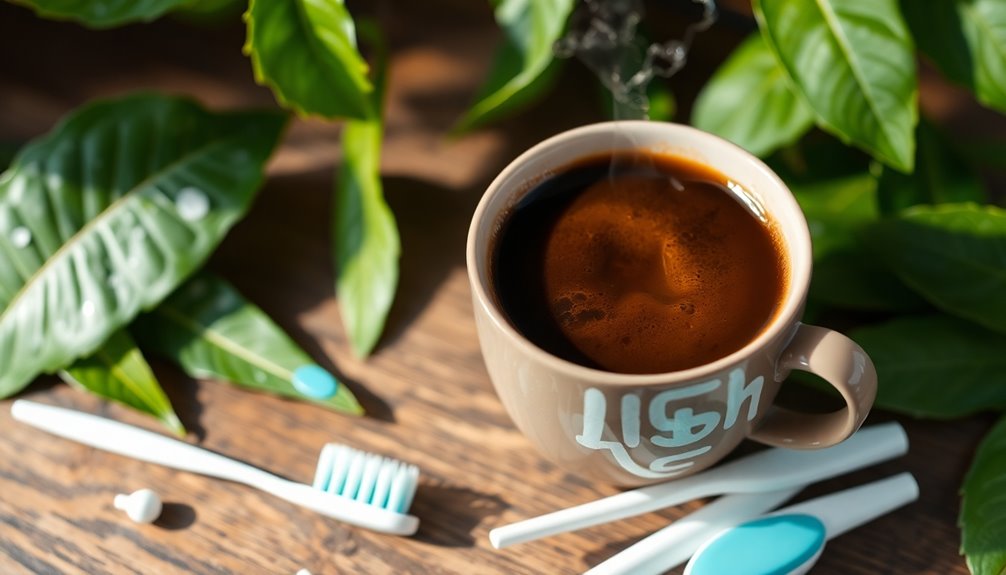
When you sip on coffee, you mightn't realize that it can contribute to dry mouth, a condition that poses significant risks to your oral health.
Caffeine's diuretic effect reduces saliva production, which is essential for neutralizing acids and washing away food particles. This lack of saliva creates an environment where bacteria that cause cavities and gum disease can thrive, increasing your risk of developing these issues.
Additionally, insufficient saliva can lead to enamel erosion, as it's vital for remineralizing teeth. You may also experience bad breath since dry mouth allows odor-causing bacteria to flourish.
To counteract these effects, make sure to stay hydrated by drinking water regularly alongside your coffee. Your oral health depends on it!
Coffee's Impact on Gum Health

While enjoying your morning cup of coffee, it's easy to overlook how it can affect your gum health. Here are some key points to reflect on:
- The acidic nature of coffee can erode tooth enamel, increasing your risk of gum disease.
- Regular coffee consumption may lead to more plaque buildup, providing a breeding ground for harmful bacteria.
- Chromogens in coffee can promote bacterial growth, worsening gum health issues.
- Without proper oral hygiene, frequent coffee drinkers might notice swollen, red, and bleeding gums.
To help neutralize these effects, maintain good oral hygiene and stay hydrated.
Stimulating saliva production is essential for your gum health and can mitigate the drying effects of caffeine.
Prioritize your gum health alongside your coffee enjoyment!
Tips for Coffee Lovers
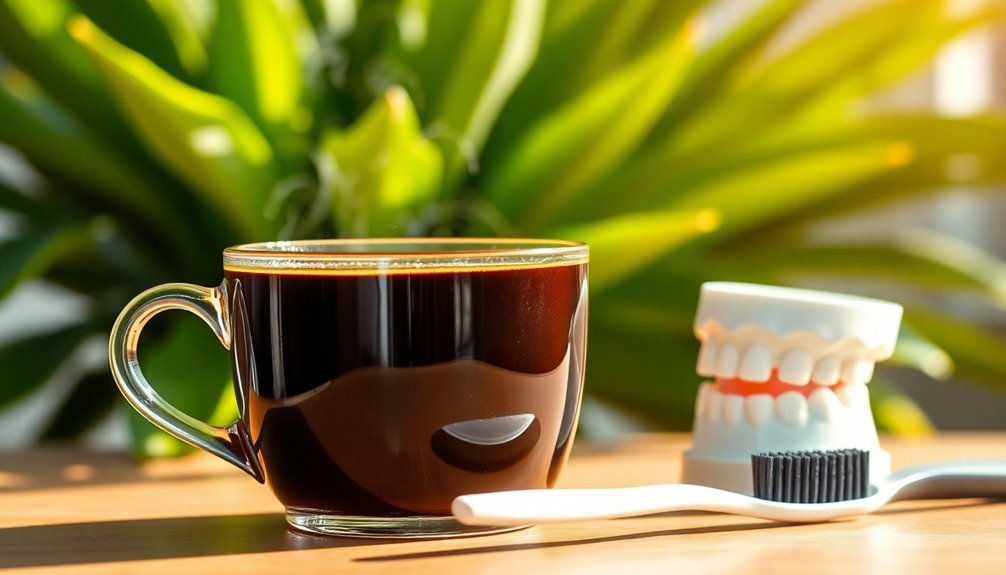
If you love coffee but want to protect your oral health, there are several simple strategies you can adopt.
| Tip | Description |
|---|---|
| Use a straw | Drink coffee through a straw to minimize contact with your teeth, reducing staining. |
| Rinse your mouth with water | Immediately rinse your mouth with water to neutralize acidity and wash away staining compounds. |
| Limit your intake | Stick to one or two cups of coffee per day to prevent enamel erosion and discoloration. |
| Choose low-acid varieties | Opt for low-acid coffee like Arabica beans to lessen the impact on your teeth. |
Maintaining a robust oral hygiene routine is also a good idea, so brush twice daily with fluoride toothpaste and keep up with dental cleanings to address any stains. Additionally, using essential oils like clove oil can provide natural pain relief if you experience tooth sensitivity from coffee consumption.
Research and Future Insights
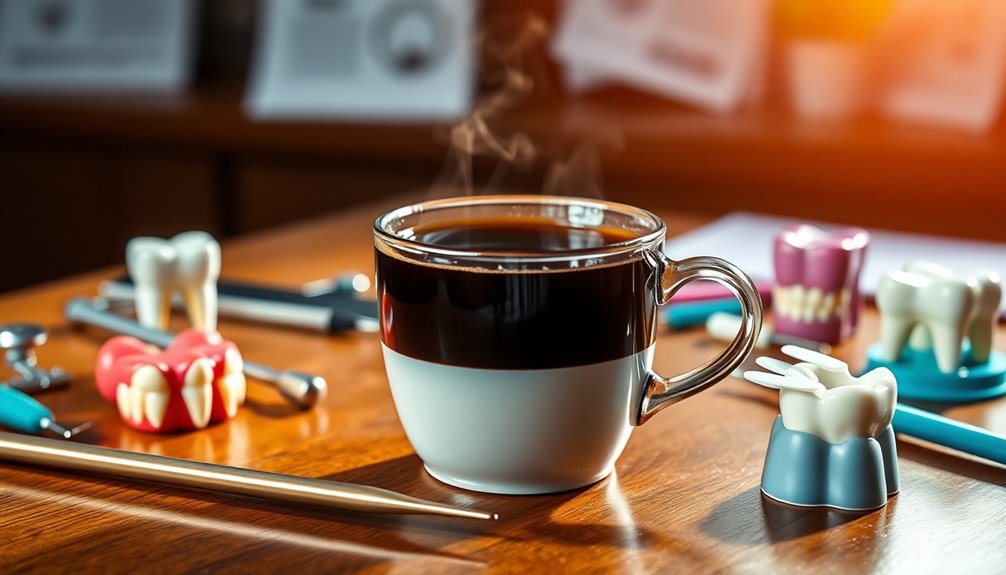
Even with tips to protect your teeth, the conversation around coffee and oral health is evolving.
Ongoing research is uncovering various aspects of coffee’s impact. Here are some key insights to evaluate: Ongoing research is uncovering various aspects of coffee’s impact. Here are some key insights to evaluate: For instance, studies have indicated that while moderate coffee consumption may offer certain health benefits, there are important considerations regarding the health risks of coffee pods. These pre-packaged coffee options often contain chemicals from the plastic and aluminum used in their production, which may leach into the beverage during brewing. Additionally, the environmental implications of single-use pods have sparked discussions about sustainability and waste management in the coffee industry.
- Enamel Erosion: Studies are focusing on how coffee affects enamel erosion over time.
- Periodontal Health: Polyphenols in coffee may inhibit harmful bacteria, potentially benefiting your gums.
- Staining Patterns: Research is investigating how different brewing methods influence staining.
- Oral Cancer Risks: Understanding coffee's link to oral cancer is vital for appraising its overall health effects.
As research progresses, you'll gain a clearer picture of coffee's role in your oral health, helping you make informed choices about your favorite beverage.
Frequently Asked Questions
How Do You Prevent Staining After Drinking Coffee?
To prevent staining after drinking coffee, rinse your mouth with water right away. This helps wash away any staining compounds.
You might also want to use a straw to reduce direct contact with your teeth. Choosing low-acid coffee varieties can further minimize staining risks.
Don't forget to brush your teeth with fluoride toothpaste at least twice a day, waiting about 30 minutes after coffee to avoid damaging your enamel.
Regular dental cleanings are key too!
How Do You Prevent Coffee Cavities?
So, you're on a quest to prevent those sneaky coffee cavities, huh? First, limit your coffee to one or two cups daily—your teeth aren't a bottomless pit of pleasure!
Rinse with water afterward to wash away those pesky acids. Consider using a straw; it's not just for kids!
Choose low-acid beans and skip the sugary fluff. Ultimately, brush with fluoride toothpaste and keep those dental appointments—because who doesn't love a good teeth check-up?
Does Mouthwash After Coffee Prevent Staining?
Yes, using mouthwash after coffee can help prevent staining. It rinses away pigments that stick to your teeth, reducing discoloration.
If you choose an alcohol-free mouthwash with fluoride, it can strengthen your enamel and protect against staining. Additionally, mouthwash with antibacterial properties can combat plaque buildup, which coffee's acidity might worsen.
How Do People Who Drink Coffee Keep Their Teeth White?
If you're looking to keep your teeth white while enjoying your favorite drink, consider a few effective strategies.
Using a straw can minimize contact between the beverage and your teeth. Rinsing your mouth with water afterward helps wash away pigments.
Limiting your intake to one or two cups daily also reduces staining potential.
Don't forget to brush with fluoride toothpaste and schedule regular dental cleanings for a brighter smile!
Conclusion
In the grand tapestry of your oral health, coffee can be both a vibrant hue and a potential stain. Imagine sipping your favorite brew, like painting a masterpiece—too much dark pigment can overshadow the canvas. By balancing your love for coffee with good dental habits, you can enjoy your daily ritual while keeping your smile bright. Remember, like any artist, it's all about the right strokes and a little care to maintain the beauty of your creation.
